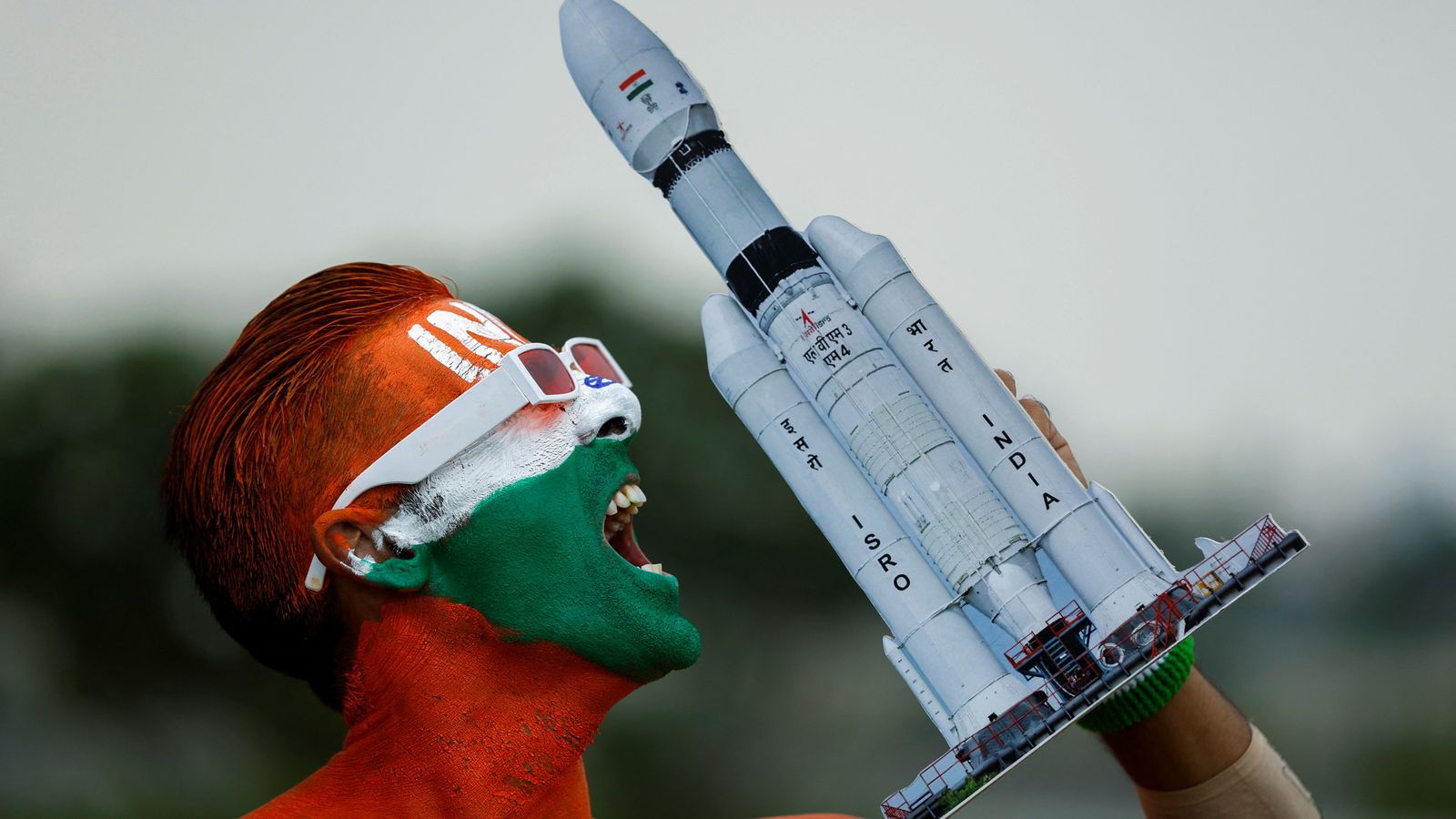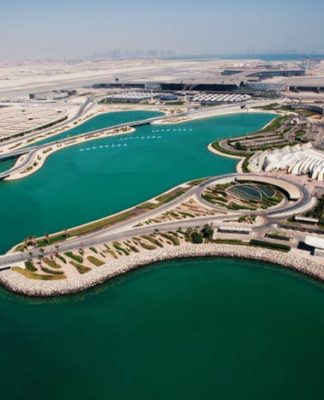India moon landing: Chandrayaan-3 could make history in space today – here’s what you need to know
Only three nations – the US, China, and Soviet Union – have ever touched down on Earth’s satellite, and none have successfully made it to the dark side. India is aiming to become the first one to do it.
By Tom Acres, technology reporter
Wednesday 23 August 2023 01:20, UK
0:00 / 4:41
1X
BeyondWords
Audio created using AI assistance
India's LVM3-M4 blasts off carrying Chandrayaan-3 lander from the Satish Dhawan Space Centre at Sriharikota, India, July 14, 2023. REUTERS/Stringer NO RESALES. NO ARCHIVES.
0:40
Play Video – India launches space mission
India launches space mission
Why you can trust Sky News
Besides a Cricket World Cup final win over Pakistan, it’s difficult to envisage anything generating more excitement in India than its historic moon mission.
In what would be a landmark achievement for not just the country’s space programme, but humanity’s efforts to explore the cosmos, Chandrayaan-3 will attempt to land on the lunar south pole.
The spacecraft’s looking to land at 1.34pm UK time – and you can watch it live on the Sky News website, app, and YouTube channel.
Here’s what you need to know.
Why does landing on the south pole matter?
Only three nations – the US, China, and Soviet Union – have ever touched down on Earth’s satellite, though none have successfully made it to the dark side.
The difficulty of doing so was made clear over the weekend when a Russian craft crashed during its own bid, meaning the door remained open for India to set a new bar for moon exploration.
It’s thought the south pole’s shadowed craters contain water ice that could support a future base on the moon, allowing astronauts and scientists to work there for extended periods.
Space agencies including NASA have detected frozen water in the moon’s south pole craters before, but no country has ever actually ventured into the region.
If water ice is really there, it could be used for fuel, oxygen, and drinking water; and provide insight into past lunar volcanoes and the origins of our own oceans.
A view of the moon as viewed by the Chandrayaan-3 lander during Lunar Orbit Insertion on August 5, 2023 in this screengrab from a video released August 6, 2023. ISRO/Handout via REUTERS THIS IMAGE HAS BEEN SUPPLIED BY A THIRD PARTY. NO RESALES. NO ARCHIVES. MANDATORY CREDIT.
Image:
A view of the moon from Chandrayaan-3
Why has nobody done it before?
As the failed Russian mission proved, it’s extremely difficult.
India knows only too well, with Chandrayaan-3’s forerunner (you guessed it, Chandrayaan-2) having crashed near its proposed landing site in 2019.
It managed to deploy an orbiter, but the lander and rover meant to actually reach the surface were destroyed.
The south pole is a long way from the region of the moon targeted by most previous missions, including the crewed Apollo landings from decades gone by.
One of the challenges facing space agencies is the moon’s dark side has very rough terrain, with deep trenches and plenty of craters.
India’s experts believe adjustments they’ve made to Chandrayaan-3, like sturdier legs, will stand it in good stead.
Members of India's Bharatiya Janata Party perform Hindu rituals for the success of Indian spacecraft Chandrayaan-3 inside a temple in Mumbai Pic: AP
Image:
Prayers are being held for the mission’s success. Pic: AP
What happens if it lands?
First, probably scenes of delirious celebration at India’s Space Research Organisation and on the streets of Delhi, Mumbai, Kolkata, and cities across the country.
Prime Minister Narendra Modi has drummed up the hype, hailing the mission as “a new chapter in India’s space odyssey” that would elevate “the dreams and ambitions of every Indian”.
Prayers have been held for the mission’s success, schools are putting on telecasts, and watch parties are planned.
Chandrayaan-3’s mission will be short but – hopefully – sweet.
It will only remain functional for two weeks if it lands, during which it will run a series of experiments to determine the mineral composition of the moon’s surface.
Much of the work will be done by a rover, which will be deployed by the spacecraft’s two-metre-high lander.
Chandrayaan-3’s time on the moon will be far less than the time it took to get there, having launched from India’s Andhra Pradesh spaceport on a LVM3 M4 rocket on 14 July.
Arun Haryani, an enthusiast with his body painted in tri-colours reacts as he holds up a model of LVM3 M4 which was used in launching of Chandrayaan-3 spacecraft on the eve of its moon landing, in Ahmedabad, India, August 22, 2023. REUTERS/Amit Dave
Image:
Space enthusiast Arun Haryani holds up a model of LVM3 M4, which was used to launch Chandrayaan-3
What will other countries make of a successful landing?
It’s safe to say Russia will likely be very jealous, having seemed determined to beat India to the punch.
In the US, NASA’s chief Bill Nelson has said he’s “looking forward” to what could be learned from the mission.
The American agency is planning its own quest to the surface of the moon’s south pole, as is China, having only explored using probes.
Read more:
Is this the ‘holy grail’ of physics?
The sci-fi epic that could change gaming
Nearly half of workers ‘would use AI to help write CV’
NASA has co-ordinated with India before, sending equipment to the moon on board Chandrayaan-1 in 2009 which detected water.
That same year, one of its own probes also found water ice below the south pole’s surface.
In the years ahead, private companies will also likely try their hand at exploring the moon – and Mr Modi hopes a successful landing on Wednesday will drive more Indian firms to invest in space.
Related Topics
India
Space






























